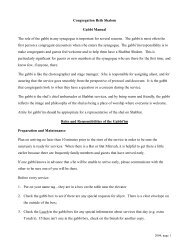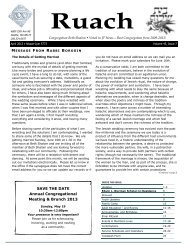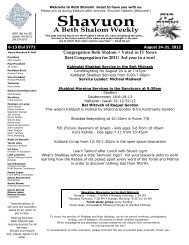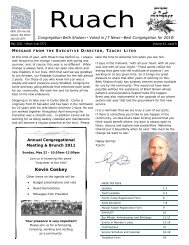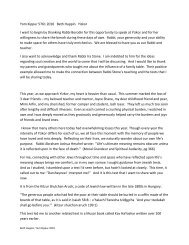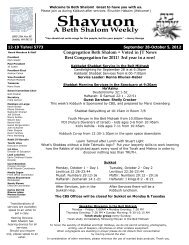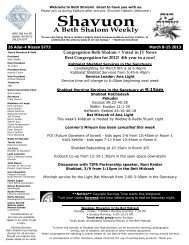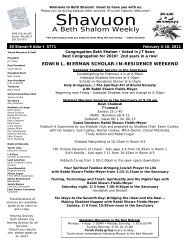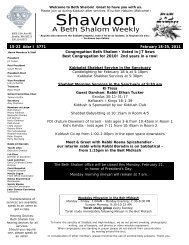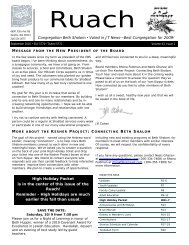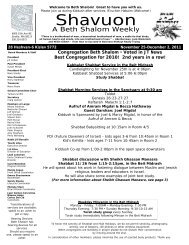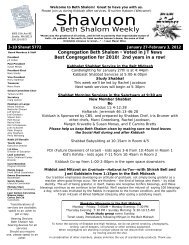D'var Torah - Congregation Beth Shalom
D'var Torah - Congregation Beth Shalom
D'var Torah - Congregation Beth Shalom
Create successful ePaper yourself
Turn your PDF publications into a flip-book with our unique Google optimized e-Paper software.
The Courage to Change<br />
RH 5770, Rabbi Jacob Elisha Fine<br />
On the second day of Rosh Hashanah we read the story of the akedah—the wellknown<br />
tale of Abraham’s near sacrifice of his beloved son Isaac. The Kotzker<br />
Rebbe once asked his students what the hardest part of the akedah was for<br />
Abraham. The students answered what you might expect. One said, bringing<br />
Isaac to the altar. Another thought it was when Abraham raised the knife,<br />
another suggested the moment was when Isaac asked his father where the<br />
animal was to sacrifice, and so on. But the Kotzker rejected all of his students<br />
answers and explained that the hardest part for Abraham was actually coming<br />
down the mountain after the ordeal took place. Why was this the most difficult<br />
part of the experience for Abraham? Because, upon coming down he now had<br />
to live with what he had done.<br />
Rabbi David Wolpe relates this teaching of the Kotzker to RH and YK. Wolpe<br />
teaches that the hardest part of the Days of Awe are actually not the 10 days<br />
themselves. Rather, the most difficult moment is actually the morning after<br />
YK—when we wake up and have to live with all of the commitments which we<br />
made and when we have the challenge of living true to the insights and<br />
yearnings which emerged from our honest self-reflections. It is the day after YK<br />
when the hardest work begins.<br />
As any of us who have ever made resolutions to change our behavior know---<br />
making the resolution is the easy part---it is actually making the change that is<br />
hard.<br />
I want to invoke the Kotzker’s words at the very outset of our 10 day journey from<br />
Rosh Hashanah through Yom Kippur—because it is critical that we take deeply to<br />
heart that our experiences over these Holy Days cannot exist independently from<br />
the rest of our lives. We should come out of YK with new insights and<br />
perspectives on our lives that inform how we want to live them. Our fervent<br />
1
praying, soul-searching and fasting over RH and YK is meaningless if we don’t<br />
come out the other end as transformed in some way.<br />
In what turned out to be his final interview before he passed on, Rabbi<br />
Abraham Joshua Heschel, by his own request, shared some thoughts with young<br />
people. As part of his words, Heschel offered a extraordinary image. He said,<br />
‘Above all, remember that the meaning of life is to build a life as if it were a<br />
work of art. You're not a machine. And you are young. Start working on this<br />
great work of art called your own existence. [pause]<br />
We are, as Heschel imagines, each of us, works of art. Though we may at times<br />
fall prey to living stale, mechanical, ossified lives, we are not machines. We don’t<br />
have to be the same tomorrow as we are today. As the artists of our own lives, it<br />
is up to us to wisely select the colors and textures which will constitute our<br />
creation. The paintbrushes are in our hands.<br />
These High Holy Days should jolt us from our complacency—to remind us that we<br />
must conduct our lives deliberately. If a painter is so intentional as to choose<br />
each new color only after calculated reflection —how much more so we should<br />
live our lives with intent.<br />
We must live on purpose.<br />
My friend and teacher, Rabbi Shai Held teaches that ‘the greatest heresy in<br />
Judaism is to believe that the world is as the world must be.’ To resign oneself<br />
to the status quo—to suppose that realities cannot change-- is indeed as<br />
profoundly anti-Jewish as believing in multiple gods.<br />
Abstractly, intellectually, we may believe that the world can change. We may be<br />
able to dream of a world where no one goes hungry. We may be able to imagine<br />
a day when Israel and its neighbors are finally living together in true peace.<br />
But in the deepest recesses of our souls, do we know this to be true about<br />
ourselves? Do I truly believe that I can become as generous with my money as I<br />
would like to be? Do I truly believe that I can forgive my parents? Do I truly<br />
2
elieve that I can become someone who can be counted on to follow through on<br />
my commitments?<br />
In our heart of hearts, do we believe that we have the capacity to truly change?<br />
Even as our tradition boldly insists that human beings have the capacity to<br />
change, to grow, to evolve—and even to totally reinvent ourselves—it is<br />
simultaneously acutely sensitive to all the reasons why personal change is so<br />
profoundly difficult for us to achieve.<br />
In a fascinating, seemingly counterintuitive, Talmudic law, the Rabbis teach that,<br />
If robbers or usurers repent and of their own free will are prepared to return the<br />
stolen articles to the rightful owner, it is not right to accept them from them,<br />
and he who does accept them does not obtain the approval of the Sages.<br />
What?<br />
To justify what appears on first glance to be a ridiculous position the Talmud tells<br />
the following story: It once happened with a certain man who wanted to return<br />
stolen property to its rightful owner that his wife said to him, Raca, if you are<br />
going to make amends and return everything that you stole, even the belt you<br />
are wearing would not remain yours. And for this reason, the man refrained<br />
altogether from repenting. It was at that time that it was declared that if<br />
criminals are prepared to return items to their rightful owners that it is not right<br />
to accept the stolen articles from them, and he who accepts from them does not<br />
obtain the approval of the Sages.<br />
In other words, in this case, the consequences of the man doing what was right<br />
and returning everything that he unlawfully possessed—would have been so<br />
great as to prevent him from living his life. So, despite his initial desire to change<br />
his ways, the man reverted to his previous corrupt behavior. With remarkable<br />
compassion and sensitivity, the Rabbis established a law that would allow<br />
individuals in this situation to make teshuvah—to mend their ways--but also to<br />
live their lives.<br />
3
Let me offer another teaching in the same spirit that may be more familiar to<br />
many of us which again reflects remarkable sensitivity to the forces which make<br />
personal change difficult. The Mishnah teaches that ‘Just as we can oppress<br />
others through business so too we can oppress them with words… For example,<br />
you may not remind a baal teshuvah-someone who has positively changed their<br />
life-- of their earlier deeds. BM 4:10<br />
This is extraordinary right?! You may not remind someone who has successfully<br />
effected sought after change in their life of how things used to be for them. And<br />
unfortunately, like so many of our most noble mitzvot, we struggle to live up to<br />
the standard our tradition sets for us.<br />
Recently, close friends, after a long heart-searching process decided to leave our<br />
community here at <strong>Beth</strong> <strong>Shalom</strong> of which they were a dedicated and beloved part<br />
and to move to another community. This move was motivated by their desire to<br />
live within a Jewish community more in alignment with their vision of the lives<br />
that they now wanted to lead. This was not an easy decision for this couple as<br />
they were deeply connected to the community they would be leaving behind<br />
here. In their minds and hearts they were in no way rejecting <strong>Beth</strong> <strong>Shalom</strong> or<br />
their friends here, they had no bad feelings or resentments--but were simply<br />
making a decision based on their natural evolution as people and as Jews. Their<br />
sincere goal was that they would continue to be deeply connected to their old<br />
community of friends—they had no intention of cutting ties.<br />
To their deep disappointment and frustration, very quickly upon announcing that<br />
they were moving communities, this couple experienced negative feedback which<br />
manifested in a variety of ways. In some cases, they received sarcastic comments<br />
which, even if playful, conveyed disapproval. But more commonly, they describe<br />
that people have simply shut off to them. They are no longer treated the same<br />
way by many of their old friends and this has been very painful for them.<br />
It seems to me that the intention behind each of these intriguing laws—both the<br />
injunction to not accept restitution from a repentant criminal and the prohibition<br />
against bringing up past behaviors to a person who has successfully achieved<br />
sought after change in their life—is the same. These decrees are meant to serve<br />
4
as protection for those who seek to effect change in their lives from those people<br />
around them who may consciously, or subconsciously, wish them to remain the<br />
same.<br />
We are obligated to allow others the space to change.<br />
We struggle when others around us make changes in their lives. We may feel<br />
threatened or rejected, feeling that the other person thinks that they are superior<br />
to use for choosing to live in a way that differs from our own. We sometimes feel<br />
jealous when we observe a friend who has managed to change him or herself in a<br />
way that we admire and would desire for ourselves. Our tradition recognizes the<br />
various impulses that would have us stunt the personal evolution of those around<br />
us.<br />
And for many of us, far harder than allowing our loved ones the space that they<br />
need in order to change and fully become who they are, is the task of our<br />
allowing ourselves to. During this period of introspection, our task is to become<br />
acutely aware of the wide chasm that exists between the person who we are and<br />
the person who we seek to be. Hopefully, with honest self-reflection we can<br />
manage to identify specific behaviors, actions and in-actions that stand in the way<br />
of us living lives that truly represent our deepest values and convictions. And yet,<br />
even when we have a vision of where we need to go—getting there eludes us.<br />
How can we close the gap between who we are and who we need to be? What<br />
resources do we have to draw on to successfully make sought-after changes in<br />
our lives?<br />
On Yom Kippur afternoon we read the famous story of Jonah—the man who tries<br />
to avoid God’s call and is swallowed by a fish. Ultimately, Jonah accepts his<br />
mission and goes to the corrupt town of Nineveh where, at the bequest of God,<br />
he proclaims that the people must repent or their city would be destroyed in 40<br />
days. It does not take long for the people of Nineveh to heed Jonah’s warning<br />
and the whole city, humans and animal alike, quickly change their ways without<br />
hesitation.<br />
5
With the people of Nineveh fasting and repenting, it appears that Jonah’s job is<br />
done. God is pleased with the people’s transformation and renounces His<br />
punishment. We would expect Jonah to be celebrating. But in a puzzling response<br />
Jonah remains distraught and leaves Nineveh’s limits and walks to an overlook<br />
where he could observe, ‘Mah yehiyah baeer’ ‘What will happen to the city.’<br />
On first glance this seems to be a bizarre response. The people have made<br />
teshuvah, God has renounced his decree—why would Jonah wait around to see<br />
what would happen to the city?<br />
Our friend and teacher Rabbi Stuart Light helped me understand what is going on<br />
here. Until this point, Jonah has witnessed the outward appearance of tshuvah—<br />
of transformation from the people of Niniveh, but he is still not convinced that<br />
these people have truly changed their ways. And so he waits. Until 40 days pass<br />
Jonah holds his breath hoping that the people of Niniveh are able to sustain their<br />
transformation—lest they revert to past behaviors and cause the destruction of<br />
the city. But, Jonah reasons, if the repentant Ninivites are able to sustain their<br />
resolve for 40 consecutive days, then true transformation has taken place and the<br />
town will be safe for good.<br />
What is special about the number 40? 40 is one of those “magic Jewish numbers”<br />
that appears over and over again in the <strong>Torah</strong> - 40 days of Noah’s flood – 40 days<br />
for Moshe on Mount Sinai, 40 years of wandering in the desert and 40 days of<br />
teshuvah for the people of Nineveh.<br />
It would seem from each of these examples, as Rabbi Light pointed out to me,<br />
that the number 40 is not random but represents the amount of time necessary<br />
to give an act or a behavior a sense of permanence. It takes 40 days for a<br />
repeated behavior to stick—to become part of the fabric of one’s being. Had<br />
Moses stayed on top of the mountain for only 39 days, he might not have fully<br />
received the <strong>Torah</strong>. And Jonah knew that, before 40 days passed, the Ninevites<br />
were still liable to fall back on their corrupt ways of the past.<br />
In the struggle to successfully effect change in our lives, Judaism’s greatest insight<br />
is the unparalleled power of habit. Aristotle said, "We are what we repeatedly<br />
6
do. Excellence, therefore, is not an act, but a habit." On this point, our sages<br />
agree with their Greek colleague. In our efforts to narrow the gap between who<br />
we are today and who we need to become—our Rabbis say—start acting today<br />
like the person who you need to become and one day you will wake up and be<br />
that person. The key to personal transformation is strategic habitual action. We<br />
are what we repeatedly do.<br />
God willing, Rosh Hashanah, Yom Kippur and the 10 days in between, will feel<br />
meaningful, important and even transformative for all of us. During this time we<br />
have the opportunity to investigate the state of our souls and to discover what<br />
areas need attention and care. As the Kotzker Rebbe reminds us, the most<br />
difficult work will lie ahead when we are faced with fully integrating into our lives<br />
the insights of this season.<br />
As a tool to help us in this work—I have made these little cards with 40 boxes and<br />
dates. If our tradition understands 40 days as the period of time that it takes for<br />
us to secure new behavior in our lives—perhaps we should give it a try? Between<br />
now and the end of Yom Kippur I invite each of you to identify one specific change<br />
which you want to establish in your life. Pick something specific and something<br />
that you can begin to work on immediately once YK has ended. Choose a<br />
behavior which you want to stop or a behavior that you need to begin. And once<br />
you have landed on your choice---try to stick with it for 40 days, from September<br />
29th through November 7th. Then each day take a pen and mark off the day.<br />
Annie Dillard writes that "The way we spend our days is, of course, the way we<br />
spend our lives." May we have the strength to spend our days ever striving to<br />
narrow the chasm between who we are and who we need to be. May we have<br />
the courage to live in accordance with our deepest commitments and may we all<br />
be inscribed in the book of life for health, happiness and for peace.<br />
Shanah tova.<br />
7



